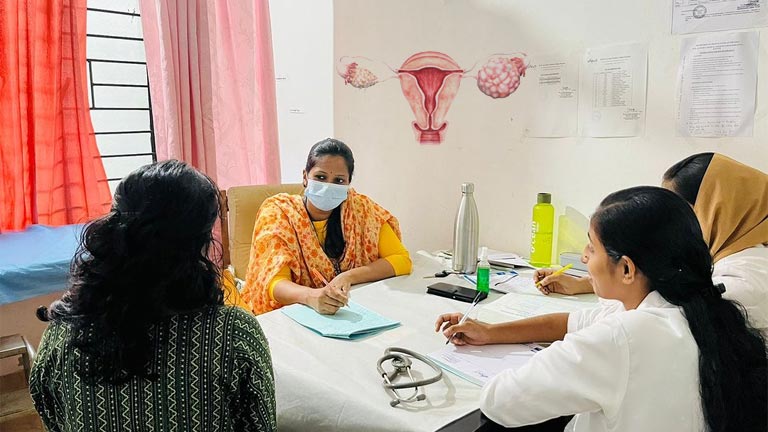Polycystic Ovary Syndrome (PCOS) is a common hormonal disorder affecting reproductive-aged women worldwide. While it presents a myriad of symptoms, one of the most challenging aspects for many women with PCOS is its impact on fertility. Fortunately, with proper management with the help of an IVF hospital and lifestyle changes, it is possible to mitigate symptoms and improve fertility outcomes. Read on to explore the complexities of the issues, their effects on fertility, and strategies to enhance reproductive health.
What is PCOS
It is a multifaceted condition characterized by hormonal imbalance, irregular menstrual cycles, and the presence of small cysts on the ovaries. Although these cysts are benign, they may lead to hormonal imbalances, resulting in a range of symptoms, including:
- Irregular periods
- Excessive hair growth (hirsutism)
- Acne
- Weight gain or difficulty losing weight
- Insulin resistance
- Infertility or difficulty conceiving
The precise origin of the problem is still unidentified, but factors such as genetics, insulin resistance, and hormonal imbalances play significant roles in its development.
Impact on Fertility
One of the most distressing aspects of the issue for many women is its effect on their reproductive potential. The hormonal imbalances and irregular ovulation associated with PCOS can make it challenging to conceive naturally. Furthermore, women with the issue have a higher risk of miscarriage and pregnancy complications.
Managing Symptoms
While PCOS cannot be cured, its symptoms can be managed effectively through various approaches:
Healthy Diet:
- Healthy Diet: For women experiencing this condition, maintaining a diet abundant in fruits, vegetables, lean proteins, and whole grains is key to controlling insulin levels and managing weight.
- Regular Exercise: Regular physical activity aids in weight management but also helps improve insulin sensitivity and regulate menstrual cycles.
- Medication: Medications might be recommended to target particular symptoms in certain scenarios. Birth control pills, for instance, can help in regulating menstrual cycles and lowering androgen levels, whereas metformin can assist in controlling insulin resistance.
- Lifestyle Modifications: Practicing stress reduction methods like yoga, meditation, and deep breathing exercises can mitigate stress, which can otherwise potentially worsen symptoms of PCOS.
- Supplements: Certain supplements, such as inositol and vitamin D, have shown promise in improving ovulatory function and insulin sensitivity in women with PCOS.
Improving Fertility Outcomes
While managing symptoms is crucial, enhancing fertility outcomes often requires additional steps:
- Tracking Ovulation: For women with PCOS who often experience irregular ovulation, employing ovulation tracking techniques like basal body temperature charting or using ovulation predictor kits can assist in pinpointing fertile periods to better time conception efforts.
- Fertility Treatments: For those facing difficulties with natural conception, options like ovulation induction using drugs such as clomiphene citrate or assisted reproductive techniques like in vitro fertilization (IVF) may be advised.
- Lifestyle Changes: In addition to addressing PCOS symptoms, embracing a healthy lifestyle through weight management, ceasing smoking, moderating alcohol consumption, and minimizing caffeine intake can enhance overall outcomes.
Emotional Support and Coping Strategies
Dealing with PCOS and its impact on reproductive potential can take a toll on a woman’s emotional well-being. The uncertainty, frustration, and disappointment associated with difficulty conceiving can lead to stress, anxiety, and even depression. Hence, women with PCOS must give importance to their mental health and pursue support as necessary.
- Seeking Support Networks: Building connections with those facing similar challenges can offer validation, comprehension, and motivation. Online support groups, forums, and local PCOS meetups can be valuable sources of support and solidarity.
- Counseling and Therapy: Seeking professional counseling or therapy can assist women in dealing with the emotional hurdles associated with infertility, helping them establish coping mechanisms for stress and anxiety. Cognitive-behavioral techniques, mindfulness-based stress reduction, and relaxation exercises can be particularly beneficial.
PCOS presents unique challenges for women seeking to conceive, but with help from an IVF hospital in Hyderabad, it is possible to improve fertility outcomes. By tackling hormonal imbalances at their root, controlling symptoms, and cultivating healthy practices, women facing this condition can improve their reproductive health and boost their likelihood of conceiving.




